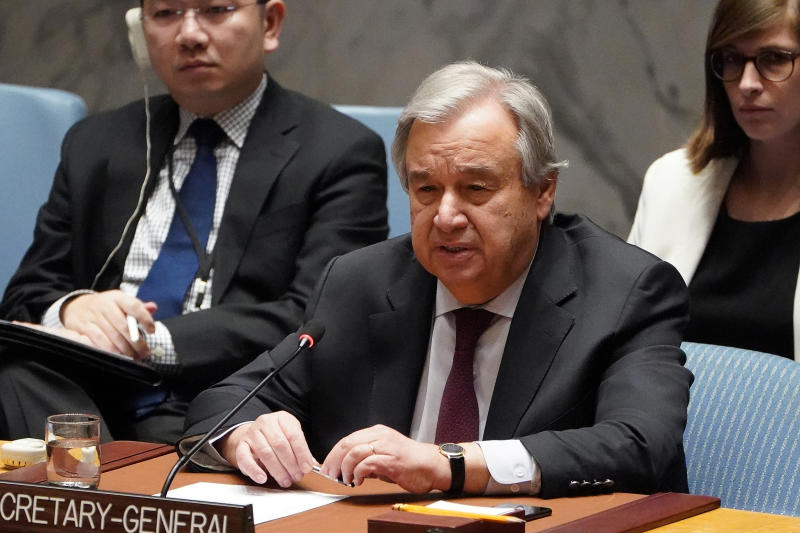UN chief says drop in emissions from coronavirus will not solve climate crisis
Sign up now: Get ST's newsletters delivered to your inbox

Secretary General of the United Nations Antonio Guterres speaks in a Security Council meeting at UN Headquarters in the Manhattan borough of New York City, on Feb 28, 2020.
PHOTO: REUTERS
Follow topic:
UNITED NATIONS, UNITED STATES (AFP) - UN Secretary General Antonio Guterres warned on Tuesday (March 10) that while the global outbreak of coronavirus may have caused a temporary drop in emissions that cause global warming, it would not end the problem and might even divert attention from the fight.
"We should not overestimate the fact that emissions have been reduced for some months. We will not fight climate change with the virus," he said.
"It is important that all the attention that needs to be given to fight this disease does not distract us from the need to defeat climate change," he said.
Guterres was speaking after the publication of a UN report on planetary warming last year, and said the situation demanded urgent action.
"Global heating is accelerating," he said as the World Meteorological Organization (WMO), a UN institution, presented its update.
The WMO report confirmed findings in December that 2019 was the second hottest year on record, "with the past decade the hottest in human history", Guterres said.
"We have no time to lose if we are to avert climate catastrophe," Guterres emphasized. "Let us have no illusions. Climate change is already causing calamity, and more is to come."
The WMO report looked at different aspects of climate change, from the accelerating sea level rise due to melting ice to changes in land and marine ecosystems.
The planet will continue to warm up if greenhouse gases continue to increase, said WMO Secretary General Petteri Taalas.
"We just had the warmest January on record. Winter was unseasonably mild in many parts of the northern hemisphere," Taalas said.
"Smoke and pollutants from damaging fires in Australia circumnavigated the globe, causing a spike in CO2 emissions," he said.
"This is exposing coastal areas and islands to a greater risk of flooding and the submersion of low-lying areas."
Manuel Pulgar-Vidal with the World Wide Fund for Nature agreed with the urgent demand for action.
"We are in a critical year for action - the longer we wait, the harder the challenge of addressing the climate crisis is going to get," he said in a statement.
Guterres said that while both the coronavirus and climate change needed a concerted international effort to counter, the two challenges were very different.
"One is a disease that we all expect to be temporary and its impact we also expect to be temporary," he said. "The other is climate change which has been there for many years and which will remain with us for decades and require constant action."
In China, the world's top greenhouse gas polluter and largest coal consumer, the economic shock waves from the coronavirus outbreak have curbed carbon pollution, but hopes for climate benefits from the slowdown are likely to be dashed quickly, experts say.
As governments prepare to spend their way out of the crisis, including with large infrastructure projects, global warming concerns will be little more than an afterthought, dwarfed by a drive to prop up a stuttering world economy, they say.
Preparations for a make-or-break UN climate summit in November are already off track, with host Britain focused on its Brexit transition, and the challenge to its health system of the gathering epidemic.
The global health emergency demonstrates the cause-and-effect relationship that drives global warming. In the four weeks up to March 1, China's carbon dioxide (CO2) emissions fell 200 million tonnes, or 25 per cent, compared to the same period last year, according to the Centre for Research on Energy and Clean Air (CREA) - equivalent to annual CO2 emissions from Argentina, Egypt or Vietnam.
As the country's economy slowed to a crawl, coal consumption at power plants in China declined by 36 per cent, and the use of oil at refineries by nearly as much.
Other major economies are bound to sputter too.
"When you turn off the global fossil fuel economy, greenhouse gas emissions go down, air quality improves," said Jon Erickson, a professor of sustainability science and policy at the University of Vermont.
But any climate silver lining will be short-lived, experts warn.
"The emissions reductions we see now because of the epidemic are temporary, not structural," said Imperial College London's Joeri Rogelj, a lead scientist on the UN's climate science advisory panel, the IPCC.
"If anything, it makes mitigation efforts harder, because it reduces our resources to invest in the transformations needed for climate change protection."

